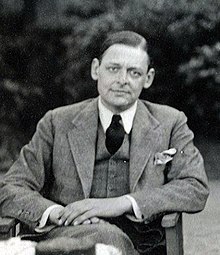Introduction:-
Thomas Stearns Eliot, OM (26 September 1888 – 4 January 1965), "one of the twentieth century's major poets" was also an essayist, publisher, playwright, and literary and social critic.[2] Born in St. Louis, Missouri, in the United States, to a prominent Boston Brahminfamily, he moved to England in 1914 at the age of 25, settling, working, and marrying there. He became a British subject in 1927 at the age of 39, renouncing his American passport.
Thomas Stearns Eliot, OM (26 September 1888 – 4 January 1965), "one of the twentieth century's major poets" was also an essayist, publisher, playwright, and literary and social critic.[2] Born in St. Louis, Missouri, in the United States, to a prominent Boston Brahminfamily, he moved to England in 1914 at the age of 25, settling, working, and marrying there. He became a British subject in 1927 at the age of 39, renouncing his American passport.



No comments:
Post a Comment